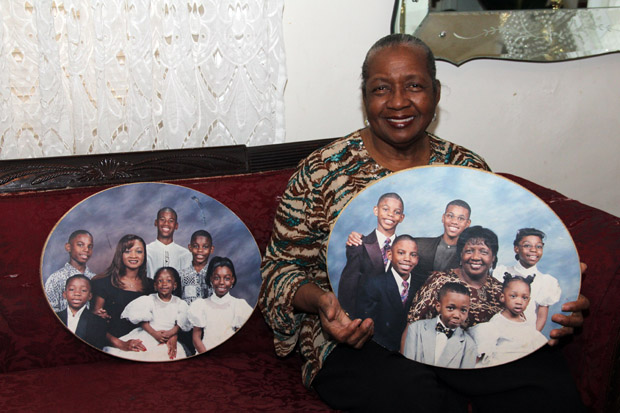
Sharonell Fulton, one of the plaintiffs in suit along with Catholic Social Services in whose favor the U.S. Supreme Court ruled June 17, displays pictures of some of the foster children she has cared for through CSS over the years. (Photo by Sarah Webb)
The U.S. Supreme Court ruled in a unanimous 9-0 decision June 17 that Catholic Social Services (CSS) of the Archdiocese of Philadelphia may not be excluded from placing at-risk children in foster homes.
In a ruling seen as a victory for religious freedom in the United States, the court ruled the City of Philadelphia acted improperly and violated the church’s First Amendment rights when it ceased referring foster children with the Catholic agency three years ago because of CSS’ practice of not placing children in same-sex households.
Now as a consequence, faith-based and other agencies across the country may not be forced by a government agency to violate their deeply held beliefs against placing children in households led by same-sex or cohabitating adults.
(Read reaction from Catholic foster parents to the decision.)
[hotblock]
CSS traditionally had chosen not to refer at-risk foster children identified by the City of Philadelphia to such households, and instead passed the referrals to another approved agency, which could place children in such homes.
The practice of deferring the city’s placements if the households were deemed contrary to Catholic teaching on marriage had been standard practice between CSS and Philadelphia’s Department of Human Services for decades.
But in 2018 that department, after calling on the public to open more homes to meet an acute need for loving homes for children, ceased all referrals to CSS, effectively shutting it out of foster care.
CSS and three women caregivers, supported by legal counsel the Becket Fund for Religious Liberty, sued the city over that decision. They lost in a U.S. district court ruling that year, as well as an appeals court ruling one year later.
The agency then appealed to the high court, resulting in Thursday morning’s decision.
Soon after the decision was announced, Philadelphia Archbishop Nelson J. Perez in a conference call with media called the court’s decision “a profound one that rings loudly in Philadelphia and reverberates throughout the country. It brings light and relief for children in need of loving homes and for the heroic foster parents who open their hearts and doors to care for them.”
He added that the ruling is “a crystal clear affirmation of First Amendment rights for the Archdiocese of Philadelphia and all charitable ministries in the United States who are inspired by their faith to serve the most vulnerable among us.”
(See the archbishop’s statement in English.)
[tower]
The archbishop said the ruling was a victory for at-risk children and noted the contributions of “foster parents who give of themselves freely,” he said.
He also said the work of Catholic social ministry would continue beyond that of foster care as it has in the archdiocese through “pioneering programs” for more than 200 years.
“The Catholic Church in Philadelphia is steadfast in its commitment to continue serving the temporal and spiritual needs of all — now and for the long term,” Archbishop Perez said. “We have partnered successfully with city government to serve the people of Philadelphia many times, and we look forward to continuing a fruitful partnership in the future.”
Because of the court’s ruling the archdiocese can continue serving those in need, and it protects “our enshrined right to religious freedom and celebrates the rich diversity of religious beliefs in the United States,” he said.
“Religious ministries,” he concluded, “cannot be forced to abandon their beliefs as the price for ministering to those in need. We can all live and work peacefully, side-by-side, to create a better and brighter future for all of our children.”
One of the plaintiffs in the suit, CSS foster mother Toni Simms-Busch, said the Supreme Court justices understood that “foster parents like me share in the common, noble task of providing children with loving homes.”
She said there was a “foster care crisis” in Philadelphia and Catholic Social Services “is a cornerstone of that ministry.
“The Supreme Court’s decision ensures the most vulnerable children in the City of Brotherly Love have every opportunity to find loving homes,” Simms-Busch said.
The work of CSS to place at-risk children in foster homes ceased three years ago, and will not resume immediately with the city because of a 90-day “cooling off” period following the Supreme Court’s ruling, according to James Amato, secretary for archdiocesan Catholic Human Services.
At the time the city excluded CSS, it was serving on average 127 foster children a day in more than 100 homes in Philadelphia. Now three years later, 12 foster children remain in CSS’s care through a maintenance provision of the contract with the city.
A number of foster parents remain available to accept placements from CSS when referrals resume from the city, according to Amato.
PREVIOUS: Delco group home residents ready for summer, thanks to Catholic school neighbors
NEXT: Foster parents welcome Supreme Court’s decision



Share this story